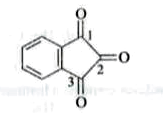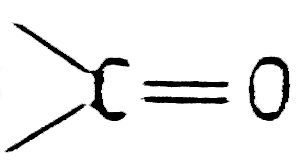Aldehydes and ketones are amphoteric. Thus they can act both as acids and bases. Under acidic conditions, the carbon of the protonated canbonyl group is much more electrophilic, reacting even with weak nucleopphilie. Carbonyl compound gives nucleophilic addition reaction. In this reaction the nucleophilic attack proceeds the elecrophilic attack.
Carbonyl compounds gives nucleophilic addition with
carbon nucleophile
oxygen nucleophile
Nitrogen nucleophile
All of these
The correct Answer is:D
Step by step video & image solution for Aldehydes and ketones are amphoteric. Thus they can act both as acids and bases. Under acidic conditions, the carbon of the protonated canbonyl group is much more electrophilic, reacting even with weak nucleopphilie. Carbonyl compound gives nucleophilic addition reaction. In this reaction the nucleophilic attack proceeds the elecrophilic attack. Carbonyl compounds gives nucleophilic addition with by Chemistry experts to help you in doubts & scoring excellent marks in Class 12 exams.
Updated on:21/07/2023Topper's Solved these Questions
- ALKENE, ALKANE & ALKYNE BOOK - ALLENCHAPTER - ALKENE, ALKANE & ALKYNE EXERCISE - EXERCISE-4(A)
10 Videos
- ALKENE, ALKANE & ALKYNE BOOK - ALLENCHAPTER - ALKENE, ALKANE & ALKYNE EXERCISE - EXERCISE-4(B)
10 Videos
- ALKENE, ALKANE & ALKYNE BOOK - ALLENCHAPTER - ALKENE, ALKANE & ALKYNE EXERCISE - EXERCISE-2
103 Videos
- AIIMS 2019BOOK - ALLENCHAPTER - AIIMS 2019EXERCISE - CHEMISTRY
40 Videos
- ALKYL AND ARYL HALIDEBOOK - ALLENCHAPTER - ALKYL AND ARYL HALIDEEXERCISE - EXERCISE-05 (B)
35 Videos
Similar Questions
Aldehydes and ketones are amphoteric. Thus they can act both as acids and bases. Under acidic conditions, the carbon of the protonated canbonyl group is much more electrophilic, reacting even with weak nucleopphilie. Carbonyl compound gives nucleophilic addition reaction. In this reaction the nucleophilic attack proceeds the elecrophilic attack.
Which one of the carbonyl compounds is more reactive towards NaCN/H+?
View SolutionAldehydes and ketones are amphoteric. Thus they can act both as acids and bases. Under acidic conditions, the carbon of the protonated canbonyl group is much more electrophilic, reacting even with weak nucleopphilie. Carbonyl compound gives nucleophilic addition reaction. In this reaction the nucleophilic attack proceeds the elecrophilic attack.
Which of these statements are correct?
View Solution
Knowledge Check
Which carbonyl group of the given compound is most reactive for nucleophilic addition reaction?
 A1B2C3DAll have equal reactivity
A1B2C3DAll have equal reactivity
Aldehydes and ketones are amphoteric. Thus they can act both as acids and bases. Under acidic conditions, the carbon of the protonated canbonyl group is much more electrophilic, reacting even with weak nucleopphilie. Carbonyl compound gives nucleophilic addition reaction. In this reaction the nucleophilic attack proceeds the elecrophilic attack.
Which of the statements are//is correct?
View SolutionAssertion : Carbonyl compounds take part in nucleophilic addition reactions.
Reason : These reactions are initiated by nucleophilic attack at the electron deficient carbon atom.
View SolutionAlkenes
 and carbonyl compounds
and carbonyl compounds  both contain a π bond but alkenes show electrophilic addition reactions whereas carbonyl compounds show nucleophilic addition reactions. Explain.
both contain a π bond but alkenes show electrophilic addition reactions whereas carbonyl compounds show nucleophilic addition reactions. Explain.
View SolutionA : Aldehydes and ketones undergo nucleophilic addition reaction.
R : Aldehydes and ketones contain carbonyl group.
View SolutionCarboxylic acids contain carbonyl group but do not show the nucleophilic addition reactions like aldehydes or ketones. Why?
View SolutionAldehyde and ketones are specially susceptible susceptible to nucleophile addition because carbonyl group
_E01_578_Q01.png) (due to electronegatvity different between carbon and oxygen).
(due to electronegatvity different between carbon and oxygen).
_E01_578_Q02.png)
Positive charge on carbon makes it reactive towards the nucleophile. This addition is catalysed by acid. Reactivity of carbonyl compound towards nucleophilic addition increases in the electron deficience at carbonyl carbon. Thus, (-I.E.) group increase while (+I.E.) groups decrease the reactivity of carbonyl compound
Which of the following is most reactve to give nucleophilic addition?
View SolutionAldehyde and ketones are specially susceptible susceptible to nucleophile addition because carbonyl group
_E01_579_Q01.png) (due to electronegatvity different between carbon and oxygen).
(due to electronegatvity different between carbon and oxygen).
_E01_579_Q02.png)
Positive charge on carbon makes it reactive towards the nucleophile. This addition is catalysed by acid. Reactivity of carbonyl compound towards nucleophilic addition increases in the electron deficience at carbonyl carbon. Thus, (-I.E.) group increase while (+I.E.) groups decrease the reactivity of carbonyl compound
Carbonyl compounds show nucleophilic addition with:
View Solution
